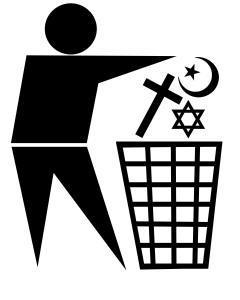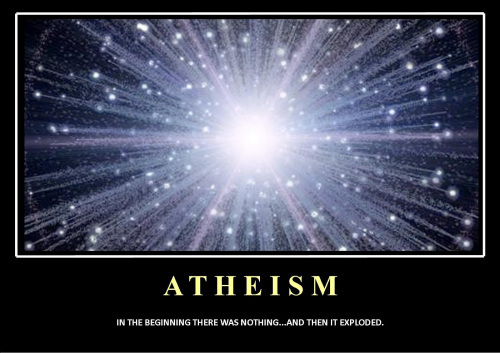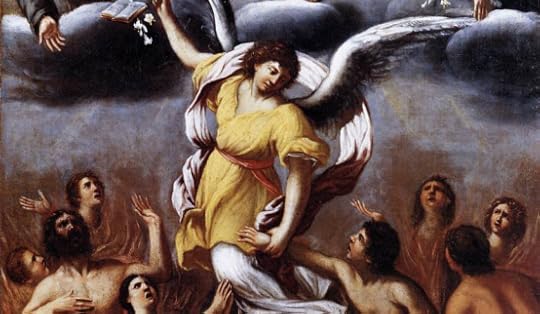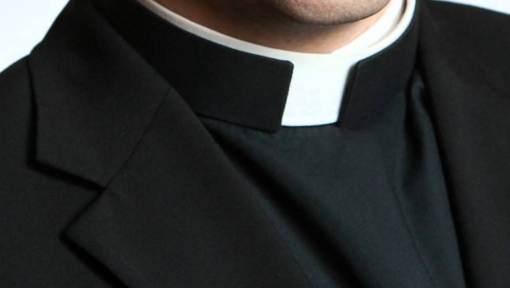Matt Fradd's Blog, page 58
May 2, 2014
What Happened to Headcoverings at Mass?
Yesterday I posted an article 3 Things Vatican II Did Not Teach.

What happened to headcoverings at Mass?
It generated some buzz, some of the comments that were posted and some of the questions that were emailed concern the mantilla, or, head coverings for women at Mass.
One person wrote to me asking:
Can you point me towards a good reference for why women are no longer required to wear a head covering during mass?
Throughout history it has been common for women to wear head-coverings. This is something which has precedent in St. Paul’s epistles (See 1 Corinthians 11:2-16).
It was mandated in the 1917 Code of Canon law. Canon 1262 states:
1. It is desirable that, consistent with ancient discipline, women be separated from men in church.
2. Men, in a church or outside a church, while they are assisting at sacred rites, shall be bare-headed, unless the approved mores of the people or peculiar circumstances of things determine otherwise; women, however, shall have a covered head and be modestly dressed, especially when they approach the table of the Lord.
Gradually this is something which fell into disuse.
In the 1970’s there was a judgment issued by the CDF in a document known as Inter Insigniores which basically stated that since chapel veils were not a matter of faith, it was no longer mandatory for women to wear them. In paragraph 4 it states:
“it must be noted that these ordinances, probably inspired by the customs of the period, concern scarcely more than disciplinary practices of minor importance, such as the obligation imposed upon women to wear a veil on their head (1 Cor 11:2-16); such requirements no longer have a normative value.”
You can read the whole document here.
In the 1983 Code of Canon Law—the one in effect today—the canon about head veils was not re-issued. Now you might be thinking, “well just because they didn’t re-issue it doesn’t mean that it’s not still in effect, right?” Wrong.
In canon 6 of the current code it states that all subsequent laws that are not reissued in the new code are abrogated:
Can. 61. When this Code goes into effect, the following are abrogated:
1. the Code of Canon Law promulgated in 1917;
2. other universal or particular laws contrary to the prescriptions of this Code, unless particular laws are otherwise expressly provided for;
3. any universal or particular penal laws whatsoever issued by the Apostolic See, unless they are contained in this Code;
4. other universal disciplinary laws dealing with a matter which is regulated ex integro by this Code.
While it is not obligatory for women to wear mantillas, I personally think they’re a beautiful and elegant way to show reverence for Christ. If you’re a woman contemplating wearing one, let me encourage you to go ahead and give it a try!—just my 2 cents.
To learn more about the Mantilla, check out the site Will You Mantilla With Me.
May 1, 2014
3 Things Vatican II Did Not Teach
In my experience, when someone ends a sentence with, “which is, after all, the spirit of Vatican II” or, “the spirit of Pope John XXIII”, they almost never know what they mean.
In fact the “spirit” they speak of is usually in direct conflict with with both Vatican II and John XXIII.
Sacrosanctum Concilium is the Vatican II document that dealt specifically with the reform of the liturgy.
In this post I thought I would (ridiculously briefly) look at three things the constitution did not say.
Ready? Let’s go!
1. Abolish Latin in the liturgy
In paragraph 54, it states: “In Masses which are celebrated with the people, a suitable place may be allotted to their mother tongue. This is to apply in the first place to the readings and to the Common Prayer. But also as local conditions may warrant, to those parts which pertain to the people.”
Yet it goes on to say, “Nevertheless, steps should be taken so that the faithful may also be able to say or to sing together in Latin those parts of the Ordinary of the Mass” (that is, the unchanging parts that we say every Sunday, such as the creed, the Gloria and the Lord’s Prayer) “which pertain to them.”
2. Give contemporary music pride of place in the liturgy
In paragraph 116, the document states: “The Church acknowledges Gregorian Chant as specially suited to the Roman Liturgy. Therefore, other things being equal, it should be given pride of place in liturgical services.”
3. Have the priest face the people during the liturgy
Nowhere in the document does it say that Mass should be celebrated facing the people. Check for yourself. Founder and President of Ignatius Press, Fr. Joseph Fessio, says “Mass facing the people is a not requirement of Vatican II; it is not in the spirit of Vatican II; it is definitely not in the letter of Vatican II. It is something introduced in 1969.”
A Caveat
In pointing to these facts, I am not insinuating that a Mass celebrated entirely in the vernacular with contemporary music and a priest facing the congregation is inappropriate or not permitted. These things are permitted. They’re just not mandated by Vatican II—or any subsequent council for that matter.
So the next time someone tells you their Mass has really “embraced the spirit of Vatican II,” you should ask them, “oh terrific, so you have gregorian chant? The parishioners know how to say the order of the Mass in Latin? . . . ”
If they look at you strange and say ‘no,’ then you might (with a look of confusion) respond with, “then what is it you mean in saying that your liturgy has embraced the spirit of Vatican II.”
April 28, 2014
Is Atheism a Religion?

Is Atheism a religion?
In this article I want to propose the extraordinarily controversial question, is atheism a religion?
What is Atheism?
Traditionally, atheism has been defined as, “the position that affirms the non-existence of God. [Which] proposes positive disbelief rather than mere suspension of belief.” [1]
Today’s atheists often claim the exact opposite. Atheism, they say, is not a positive proposition, but rather, a suspension of belief. Though atheists are, of course, free to adopt any definition they’d like, this word play certainly makes for confusing conversation.
The concept of “agnostic”, it seems, has been evicted from it’s letters and forced to take up residence in the seemingly muscular shell of “atheism.” The concept of “atheism” now appears to be cohabiting with “naturalism.” The two seem very happy together. [2]
In considering the question, is atheism a religion, I want to deal, not with the novel (suspended-belief/synonymous-with-agnosticism) definition but with the traditional (positive proposition) one.
Religion
According to Dictionary.com, Religion can be defined as:
1. a set of beliefs concerning the cause, nature, and purpose of the universe, especially when considered as the creation of a superhuman agency or agencies, usually involving devotional and ritual observances, and often containing a moral code governing the conduct of human affairs.
Atheism is a set of beliefs cocerning the cause (it has none), nature (it is the result of matter + time + chance), and purpose (there is none) of the universe.
It is interested in answering what religions are interested in answering: “Is there such a person as God? How should we live? Can we look forward to life after death? What is our place in the universe? How are we related to other creatures?
[Atheism] gives answers here: there is no God, and it makes no sense to hope for life after death. As to our place in the grand scheme of things, we human beings are just another animal with a peculiar way of making a living”[3].
Devotional Practices?
You might be thinking, okay, what about the “devotional and ritual observances” part? Atheists don’t do that do they? umm, they’re starting to. They even have a Sunday schedule:
Welcome / notices
Song
Guest speaker
Song
Reading
Final Address
Song
What? Where no donuts!? Classic rookie mistake. Anyway, those are my thoughts… What are yours?
_________________
[1] The Routledge Encyclopedia of Philosophy.
Also, The Encyclopedia of Philosophy states: “According to the most usual definition, an atheist is a person who maintains that there is no God.”
[2] Atheists are by no means the only group guilty of this word play. I’m sure most of you recall that unfortunate video, “Why I Hate Religion, But Love Jesus.” Some of the atheist YouTube commentators I’ve seen have been merciless in condemning the video as a distinction without a difference; I’m in full agreement with them.
[3] Plantinga, Alvin, Where the Conflict Really Lies: Science, Religion, and Naturalism.
5 Amazing Quotes from True Devotion to Mary

St. Louis de Montfort. Demontfort (1673 –1716).
Today is the feast of St. Louis de Montfort. Demontfort (31 January 1673 – 28 April 1716) was a French priest whose work, True Devotion to Mary, is still generally thought to be the best single volume on devotion to the Blessed Mother.
Saint John Paul the Great once recalled how, as a young seminarian, he “read and reread [True Devotion to Mary] many times and with great spiritual profit. … Then I understood that I could not exclude the Lord’s Mother from my life without neglecting the will of God-Trinity.” [1]
Here are 5 quotes from Demontfort from that book.
1.
“With the whole Church I acknowledge that Mary, being a mere creature fashioned by the hands of God is, compared to his infinite majesty, less than an atom, or rather is simply nothing, since he alone can say, ‘I am he who is’. (14)
2.
“Satan fears her not only more than angels and men but in a certain sense more than God himself. This does not mean that the anger, hatred and power of God are not infinitely greater than the Blessed Virgin’s, since her attributes are limited. It simply means that Satan, being so proud, suffers infinitely more in being vanquished and punished by a lowly and humble servant of God, for her humility humiliates him more than the power of God.”(52)
3.
“When the Holy Spirit, her spouse, finds Mary in a soul, he hastens there and enters fully into it. He gives himself generously to that soul according to the place it has given to his spouse.” (36)
4.
“Mary is the Queen of heaven and earth by grace as Jesus is king by nature and by conquest. But as the kingdom of Jesus Christ exists primarily in the heart or interior of man, according to the words of the Gospel, “The kingdom of God is within you”, so the kingdom of the Blessed Virgin is principally in the interior of man, that is, in his soul. It is principally in souls that she is glorified with her Son more than in any visible creature. So we may call her, as the saints do, Queen of our hearts.” (38)
5.
“She is so full of love that no one who asks for her intercession is rejected, no matter how sinful he may be. The saints say that it has never been known since the world began that anyone had recourse to our Blessed Lady, with trust and perseverance, and was rejected.”(85)
April 26, 2014
My latest Radio Interview on Atheism
Here is a recent radio interview I did on the topic of atheism. In it I talk about helpful vs. unhelpful approaches when dialoguing with atheists, respond to a few atheistic objections, and talk aabout my new book on atheism that will be out NEXT MONTH!
http://s3.amazonaws.com/sgraudio/FamilySanctuary/Fradd_13.mp3
April 24, 2014
Uncommon Photos Of John Paul the Great
I’m always disappointed when I turn to the shiny pages in the middle of a Pope John Paul book only to see photos that I’ve seen a million times before. So in spirit of spending my time wisely, I’ve spent the past hour mining the internet for uncommon photos of the big man. Here are ten of them.
If you’re looking for a book to celebrate the canonization of John Paul the Great, get Jason Evert’s new book, Saint John Paul the Great. I bought it for lent, read it with my wife, loved it.
Oh, and to all of my friends partying it up in Rome this week; totally offended you took your spouse/brother/sister/parent/friend instead of me.
April 23, 2014
The Immaculate Conception: A Socratic Dialogue
I’ve really enjoyed writing these socratic dialogues this past week. Thanks for your feedback.
Before we begin
A word of warning: These dialogues aren’t meant to cover every aspect of or every objection to each doctrine. There’s more that could be said. And, indeed, more that has been said (for starters, see here, here, and here). These dialogues are meant to be a fun and intellectually stimulating introduction to Catholic teachings that can sometimes be tough to wrap one’s heads around.
Also, I’ve tried to make it a reasonably fair exchange between Sam (the Protestant) and Justin (the Catholic), but I haven’t tried that hard. The goal here is to demonstrate the superiority of the Catholic position, something that couldn’t be done in the space I’ve done it in if I were to launch every Protestant objection to the doctrines discussed.
Cool? I don’t think Protestants are cotton-headed ninny muggins’s. Promise.
Enjoy, and please give me your feedback below.
The Immaculate Conception
Sam: So up until last year I thought that the “immaculate conception” Catholics spoke of referred to Christ.
Justin: Ha! You’re in good company. Unfortunately many Catholics mistakenly think that too. But no, it refers to Mary being conceived without the stain of original sin.
Sam: Where in the Bible does it say explicitly that Mary was without Sin? Nowhere. In fact, Romans 3:23 states that all have sinned and have fallen short of the glory of God. If Mary was sinless, she wouldn’t need a savior, right? And yet she herself says in Luke 1:47 “My spirit rejoiced in God my savior.” And…
Justin: Sam?
Sam: …what?
Justin: I’m happy to do my best to answer your questions but you gotta give them to me one at a time, okay? I, unlike the Holy Mother of God, I am unable to respond to multiple petitions at once.
Sam: Oh don’t get me started.
Justin: Too late, I guess.
Where in the Bible…
Sam: Point me to a passage where it says explicitly that Mary is without Sin.
Justin: Explicitly? I can’t, there is no such verse.
Sam: Then how can you say that she was without sin?
Justin: Because unlike you I don’t hold to the non-biblical view that we should only believe those things which are taught explicitly in Scripture. I “hold to the traditions” that have been given to us “either by word of mouth or by letter” (2 Thes 2:15). I believe that the immaculate conception was part of the deposit of faith, that it’s true, and that it’s not a doctrine Christians are free to reject.
Sam: And yet it’s stated nowhere explicitly within scripture?
Justin: I don’t want this to turn into an argument over sola scriptura, we can discuss that “tradition of men” at a later date. For now let me just respond by saying, you accept the canon of the New Testament: Matthew, Mark, Luke, John, Acts, and so forth. Point me to a passage where it says those particular books are inspired?
Sam: That’s a stupid question.
Justin: Then give me a stupid answer.
All Have Sinned
Sam: I’ll tell you what the Bible does teach explicitly and that is that all have sinned and have fallen short of the glory of God (Rom. 3:23). “All” would include Mary.
Justin: “All” would also include Jesus, right?
Sam: Well obviously Jesus is an exception.
Justin: Well since you concede Romans 3:23 admits exceptions, why not think Mary is also an exception?
Sam: Because there is no good reason think that.
Typology
Justin: Do you know what typology is, Sam?
Sam: Oh I don’t know, some Catholic invention I suppose.
Justin: Ha! No, actually. Typology is the study of persons, places, events, etc. in the old testament that foreshadow a greater reality in the new. Paul talks about it in Romans…Gimme a sec, let me grab my Bible out of my bag…Here it is; Romans 5:14, “Yet death reigned from Adam to Moses, even over those whose sins were not like the transgression of Adam, who was a type of the one who was to come.” You believe Jesus is the new Adam, yes?
Sam: Yes.
Justin: Well, I think it’s reasonable to conclude that Mary is the New Eve. Just as the first woman, Eve, said yes to the fallen angel Lucifer and brought forth death upon her children, so the new woman, Mary, said yes to the angel Gabriel and brought forth life himself, and, indeed, the possibility of eternal life upon her children, the Church. If the new Adam is without sin, why couldn’t God create the new Eve without sin?
Perfect Like God?
Sam: Jesus is without sin because Jesus is God. To say that Mary is without sin is to put her on the same level as God.
Justin: Not at all. Mary is a creature. Look, do you think that before Adam and Eve sinned they were on the same level as God?
Sam: Obviously not.
Justin: And yet they were without sin, right? Do you think the angels are on the same level as God?
Sam: Yes, yes, I see your point. But if Mary is without sin then she wouldn’t need a savior, right? And yet she says explicitly in Luke 1:47 that she has a savior, therefore she can’t be perfect.
Saved: Medicinal and Preventative
Justin: If I found you in a pit…
Sam: Here we go…
Justin: Just hear me out. If I found you in a pit in the middle of a forest, a pit that you couldn’t get out of on your own, and I helped you out, it’d be fair to say that I saved you from the pit, yes?
Sam: Si Signore.
Justin: What was that, Italian?
Sam: I don’t know. Just finish your analogy.
Justin: Ran-dom. Well, what if at the moment you were about to fall into the pit, I prevented you by grabbing your shirt and pulling you back. Isn’t it true that I saved you from the pit, though in a different sense?
Sam: yeah, I guess.
Justin: Mary was saved like that. Not medicinally, like you and me, but preventatively. As Pope Pius IX put it in Ineffablilis Deus…I think I’ve got a copy in my bag here. Yes, here it is. He writes:
the most Blessed Virgin Mary, in the first instance of her conception, by a singular grace and privilege granted by Almighty God, in view of the merits of Jesus Christ, the Savior of the human race, was preserved free from all stain of original sin, is a doctrine revealed by God and therefore to be believed firmly and constantly by all the faithful.
Sam: Ineffabuley, what now?
Justin: What, you can speak Italian but I can’t speak Latin? I see how it is!
Thomas Aquinas Said What??
Sam: You do realize that Thomas Aquinas rejected the Immaculate conception, don’t you? If Mary’s sinlessness is supposed to be something the whole Church has always believed, how do you explain that?
Justin: Sam, I’m impressed! You’ve been doing your homework.
Sam: So you don’t deny it.
Justin: Well, you’re half right. It’s true that Thomas didn’t understand how Mary could be sanctified from the womb, it’s false that he rejected the immaculate conception, and it’s absolutely not true that Thomas thought Mary committed sin.
Sam: Prove it.
Justin: I think I have a copy of Aquinas’s Summa Theologiae here somwhere…
Sam: Good grief, you’re like Mary Poppins!
Justin: Here it is, he writes:
I answer that, God so prepares and endows those, whom He chooses for some particular office, that they are rendered capable of fulfilling it, according to 2 Cor. 3:6: “(Who) hath made us fit ministers of the New Testament.” Now the Blessed Virgin was chosen by God to be His Mother. Therefore there can be no doubt that God, by His grace, made her worthy of that office, according to the words spoken to her by the angel (Lk. 1:30,31): “Thou hast found grace with God: behold thou shalt conceive,” etc. But she would not have been worthy to be the Mother of God, if she had ever sinned. First, because the honor of the parents reflects on the child, according to Prov. 17:6: “The glory of children are their fathers”: and consequently, on the other hand, the Mother’s shame would have reflected on her Son. Secondly, because of the singular affinity between her and Christ, who took flesh from her: and it is written (2 Cor. 6:15): “What concord hath Christ with Belial?” Thirdly, because of the singular manner in which the Son of God, who is the “Divine Wisdom” (1 Cor. 1:24) dwelt in her, not only in her soul but in her womb. And it is written (Wis. 1:4): “Wisdom will not enter into a malicious soul, nor dwell in a body subject to sins.”
We must therefore confess simply that the Blessed Virgin committed no actual sin, neither mortal nor venial; so that what is written (Cant 4:7) is fulfilled: “Thou art all fair, O my love, and there is not a spot in thee,” etc. (Summa Theologiae III:27:4)
Sam: Okay, okay, honestly? I’m more concerned with what the Scriptures say, not Thomas Aquinas. But you said he wasn’t sure how God could have her be sanctified from the womb. If this is supposed to be a teaching the Church has accepted since the beginning how is that he was unaware of it?
Change Vs. Development
Justin: Well, first of all, even if Thomas rejected the immaculate conception, that wouldn’t prove that it wasn’t believed, in seed form at least, since the time of the apostles, it could just mean that Thomas was a heretic, which he was not. Secondly, there’s a difference between doctrinal change and doctrinal development.
Sam: Go on.
Justin: Well, put it this way, do you think that St. Peter would have understood the following from St. Athenasius who wrote in the third century… “we worship one God in Trinity, and Trinity in Unity; Neither confounding the Persons; nor dividing the Essence. For there is one Person of the Father; another of the Son; and another of the Holy Ghost. But the Godhead of the Father, of the Son, and of the Holy Ghost, is all one; the Glory equal, the Majesty coeternal.”
Sam: You’re no longer allowed to bring your bag to these meetings. How should I know, he’d probably have no idea what you were talking about.
Justin: Right! But that doesn’t mean that the Church’s understanding of the Trinity changed, just that it developed. In a similar way, the Church has always know that Mary was without sin. St. Augustine, in his work, Nature and Grace, writes:
We must except the holy Virgin Mary, concerning whom I wish to raise no question when it touches the subject of sins, out of honour to the Lord.
Sam: Let me get this straight. You believe that Mary had to be sinless in order for Jesus to be sinless? Because she gave birth to him?
Justin: Nope. We don’t believe that Mary had to be sinless, just that it was fitting that she was. One defender of the immaculate conception put it like this “God could do it, it was fitting that he did it, and so he did it.”
Sam: Okay.
Justin: So what do you think?
Sam: That you’re in slightly better shape than a pagan. But only slightly.
Justin: I’ll take that as a compliment.
Looking to delve deeper?
April 22, 2014
Is Jesus a spinoff of the Pagan gods?

In this article I’d like to examine and respond to the claim that the story of Jesus Christ was borrowed from earlier mythologies.
Similarity Does Not Imply Dependence
Before we look at some of these alleged parallels between Christianity and paganism (and why they’re false), it’s important to note that similarity does not imply dependence. That is, even if Christianity did have beliefs and practices similar to those of earlier religions, it doesn’t follow that there must be a causal connection between them.
Similarities among religions shouldn’t surprise us. Most religions, after all, try to answer the same fundamental questions in life: “Where did we come from?” “Is there an afterlife?” How should we live?” Most religions have rituals, sacred stories, and moral codes. It would be surprising if there weren’t some similarities among them. In fact, you might say that the similarities are a sign that God does exist—you might expect different religions in different eras and cultures to reach many similar conclusions about what he’s like and how to relate to him.
Jesus, Pagan Myth, & Antisemitism
Claims that Christian beliefs about Jesus are adapted from pagan cults may be popular today, but they’re nothing new. A school of nineteenth-century German theologians sought to interpret Jesus against a pagan background rather than a Jewish one, perhaps due to the anti-Semitic desire for an Aryan Jesus. The movement continued into the early twentieth century with writers such as J. M. Robertson, William Benjamin Smith, Arthur Drews, and others who sought to deny the historicity of Christ by drawing upon the work of liberal theologians who tended to deny the value to the sources for Jesus outside of the New Testament.
Unfortunately for these critics, their arguments were not taken seriously by mainstream critics and their work fell into relative obscurity. It was not until a British professor of German named G.A. Wells rediscovered and translated this German scholarship in the 1970’s that the myth argument rose to prominence again. However, it is still a fringe movement and even Wells has abandoned it and admits there is a historical basis for the stories about Jesus.[1]
The fact is, there is no serious debate among the vast majority of scholars in the fields related to the question of the historicity of Jesus. Even agnostics such as Bart Ehrman who has become popular for his arguments against the reliability of the New Testament admit that Jesus was a real historical figure, he writes, “The view that Jesus existed is held by virtually every expert on the planet” [2]
Among the many ancient pagan deities of which Christ is said to be a copy, the Egyptian god Horus seems to get the most attention. Although much could be said about each of the alleged parallels between Jesus and Horus, due to our limited space we will examine three: 1) Horus’s virgin birth, 2) his crucifixion, and 3) his resurrection.
1) Horus was born to a virgin mother.
Several different (and contradictory) stories about Horus have developed gradually over the last 3,000 years, but the most common story of his conception espoused by mythicists today involves his father, Osiris and mother, Isis.
It goes like this: When Osiris was murdered and his body cut up into fourteen pieces, his wife Isis journeyed throughout Egypt collecting them. She was able to find all pieces except his genitals (not making this up), which had been eaten by catfish at the bottom of the Nile. Isis then makes a prosthetic phallus, gets impregnated by it and along comes Horus.
A virgin birth? Not exactly.
2) Horus was crucified.
How did Horus die? Well, again, that depends on which account you go by. Horus either 1) did not die, 2) died as a child after having being poisoned by a scorpion, or 3) his death is conflated with Osiris (recounted above). Meanwhile the popular mythicist film Zeitgeist claims he was “crucified.” Now, crucifixion was a Roman invention; there was no Egyptian equivalent. So what is the justification for this belief? There are images of Horus standing with outstretched arms. That’s it.
As the film’s study guide explains, “The issue at hand is not a man being thrown to the ground and nailed to a cross, as Jesus is depicted to have been, but the portrayal of gods and goddesses in cruciform, where by the divine figure appears with arms outstretched in a symbolic context.”[3]
By this line of reasoning we should also conclude that Barney the dinosaur was also crucified, since there are many images of him standing with outstretched arms!
3) Horus rose from the dead.
The fact is that the dying and revivification of Horus is vastly dissimilar to the death and resurrection of Christ. Indeed the view that ancient pagan religions were filled with dying and rising gods which the New Testament authors borrowed from in order to concoct the story of Christ was put to rest by Jonathan Z. Smith in the late 1980s, in his article “dying-rising gods” in the scholarly and authoritative Encyclopedia of Religion. He writes
“The category of dying and rising gods, once a major topic of scholarly investigation , must be understood to have been largely a misnomer based on imaginative reconstructions and exceedingly late or highly ambiguous texts. . . . All the deities that have been identified as belonging to the class of dying and rising deities can be subsumed under the two larger classes of disappearing deities or dying deities. In the first case the deities return but have not died; in the second case the gods die but do not return. There is no unambiguous instance in the history of religions of a dying and rising deity.”[4]
When Dialoging with a Mythicist
When dialoging with those who claim that Jesus is just a spinoff of a pagan God, you should keep three things in mind.
1) Ask them where they are getting their information. If they point you to a particular website or movie, ask them where that website or movie got their information.
2) Take the parallels one at a time. It’s easy for someone to rattle off a list of alleged parallels making it appear that the evidence is overwhelming, but if you take the time to examine each supposed parallel you’ll find, as we found above, that they are not very similar at all.
3) Study the alleged parallels from authoritative sources yourself. You could purchase The Oxford History of Ancient Egypt, put out by Oxford University Press. For a shorter treatment read some of the insightful articles that my colleague, Jon Sorensen has written. I’d also strongly suggest watching the following talk, “refuting zeitgeist the movie” by Professor of philosophy and religion, Mark W. Foreman:
Join the Discussion
Was this article helpful to you?
What other alleged parallels have you heard proposed?
What resources are you aware of that could help Christians better respond to mythicist claims?
—————————————
[1] Can We Trust the New Testament? by George Albert Wells (Nov 26, 2003) ISBN 0812695674 p. 43
[2] Did Jesus Exist?, p. 4
[3] http://www.zeitgeistmovie.com/Zeitgeist,%20The%20Movie-%20Companion%20Guide%20PDF.pdf
[4] Cited in Jonathan Z. Smith, “Dying and Rising Gods,” Encyclopedia of Religion, 2nd ed. Lindsay Jones, (Detroit: Macmillan, 2005 [original: 1987]), 4:2535).
Purgatory: A Socratic Dialogue
Sam: Though I’m not a Catholic, I do respect the Catholic Church’s willingness to dispense with some of those old superstitions that arose in the middle-ages, like purgatory and that.
Justin: Um, what?
Sam: Yeah, you know how you all used to believe in purgatory but now that’s been done away with?
Justin: Yeah; sorry to disappoint you but that isn’t true. Purgatory is an infallible teaching of the Church, not an invention of the middle-ages, it’s part of the deposit of faith left to us by Christ and the apostles, it hasn’t been “done away with.”
Sam: Ah, I’m sure I read that somewhere.
Justin: Well as reliable a source as that sounds, I’m telling you it’s false. The Church teaches that, “all who die in God’s grace and friendship, but still imperfectly purified, are indeed assured of their eternal salvation; but after death they undergo purification, so as to achieve the holiness necessary to enter the joy of Heaven” (CCC 1030)
Sam: Fair enough; I stand corrected.
Justin: If you’re a Bible believing Christian, as you claim, you should believe in purgatory as well—of course if you were a Bible believing Christian you should be Catholic, but one step at a time.
Sam: See, now you’re just being condescending.
Justin: A little, but play along. You believe that the Bible is the word of God, yes?
Sam: Yes, Justin, I believe that the Bible is the word of God.
Justin: Good, so you believe, as it says in Revelation, that “nothing unclean shall enter heaven.”?
Sam: Yes, that’s right.
Justin: And what do you think the bible means by “unclean”?
Sam: Well it’s not referring to those who haven’t showered recently; it’s talking about sin. Sin is what makes us unclean.
Justin: And what about attachment to sin? Will we have that in heaven?
Sam: What do you mean “attachment”?
Justin: Say a woman has repented of and ceased committing adultery, but in hear heart she still wants to commit adultery. She no longer commits the sin of adultery but she wishes she could, she’s envious of those who do commit it.
Sam: No, obviously the saved will not experience anything like that in Heaven.
Justin: But isn’t it true, Sam, that a good number of those who will be saved are either sinning or attached to sin at the moment of their death? That they aren’t perfect as their heavenly Father is perfect? That they aren’t clean?
Sam: I’m sorry, Justin. I think your argument is judgmental, and we have been forbidden by our Lord to judge.
Justin: That’s a red herring, Sam. Arguments are not judgmental, people are. Arguments are sound or unsound. How is this argument unsound. 1. The saved will not sin nor be attached to sin in heaven. 2. Many people who will be saved are still sinning or attached to sin at the moment of their deaths. 3. Therefore there must be stage between this life when those who will be saved are unclean and Heaven when those who will be saved are perfectly clean. Catholic call that stage purgatory.
Sam: Your problem, Justin, is that you rely on logic and reason instead of the word of God.
Justin: If the price of protestantism is irrationality, that’s not a price I’m willing to pay. Besides, it’s false that I have not relied on the word of God, I have, and, I think, if you will follow the teachings of the Holy Bible you should believe in purgatory as well. You’re familiar with C.S. Lewis?
Sam: Of course.
Justin: He understood purgatory to be perfectly reasonable. He spoke of if in one of his letters.
Sam: Which one?
Justin: I’m not sure. Let me look it up. Give me a sec. Ah, here it is. He writes:
“Our souls demand purgatory, don’t they? Would it not break the heart if God said to us, “It is true, my son, that your breath smells and your rags drip with mid and slime, but we are charitable here and no one will upbraid you for these things, nor draw away from you. Enter into joy”? Should we not reply, “With submission, sir, and if there is no objection, I’d rather be cleansed first.” It may hurt, you know” — ”Even so sir.”
Sam: Well how long is purgatory supposed to take?
Justin: How should I know? We don’t even know how time works in the afterlife, it might not take any time at all. Cardinal Joseph Ratzinger (now Pope Emeritus Benedict XVI) seemed to side with those theologians who say that purgatory may be the very encountering of God’s love which purifies us and might not take any “time” at all. He wrote, “[Purgatory] is the inwardly necessary process of transformation in which a person becomes capable of Christ, capable of God and thus capable of unity with the whole communion of saints.” [1]
Sam: I’ll admit it. Purgatory isn’t as crazy an idea as I once thought. I’m not completely sold, but I’m open. Where could I learn more?
Justin: You could read what the Catechism of the Catholic Church has to say about it. At least that way if you disagree with the Catholic Church you’ll disagree about what it is she actually teaches, as opposed to what you’ve heard she teaches. Also, there’s this apologist, Matt Fradd? He’s amazing, and way better looking than that Chris Stefanick character—if you know who he is. Here’s an audio clip of him explaining it in his deliciously delightful Australian tongue:
http://mattfradd.com/wp-content/uploads/2013/09/matt-fradd-8-20-13.mp3
Sam: … Ah, dude, are you okay?
Justin: I’m fine…sorry. Not sure what came over me.
———-
[1] Joseph Ratzinger, Eschatology: Death and Eternal Life, p. 230-231
April 21, 2014
Call No Man Father? A Socratic Dialogue
I was pleased that so many people wrote to me expressing their thanks for my last socratic dialogue on the motherhood of God. I thought I’d try my hand at another one.
Sam: Okay, since you love logic so much, I have a syllogism for you.
Justin: Let’s hear it!
Sam: Premise 1: In Matthew 23:9, Jesus said “call no man Father.” Premise 2: Catholics call priests Father. Conclusion: Therefore Catholics are in direct violation of Jesus’ command. What say you? Seems pretty air-tight to me, don’t you think?
Justin: Sam, do you hate your Father and Mother?
Sam: I’ll admit it. There were a number of things I thought you’d say in response to my argument; that wasn’t one of them. What are you talking about? Just answer the question.
Justin: I am, in a round about way. Do you hate your mother and father?
Sam: If you’re trying to make the point that It’s legitimate to call my earthly Dad, Father, I agree. But the . . .
Justin: That’s not the point I was trying to make. Do you hate your mother and father?
Sam: No, obviously not. I love them.
Justin: Premise 1: In one of the gospels Jesus says, “If anyone does not hate his own Father and Mother he cannot be my disciple.” Premise 2: You do not hate your Father and Mother. Conclusion: Therefore you cannot be Jesus’ disciple. Tell me what’s wrong with my argument and you’ll have the answer as to what’s wrong with yours. … Bazinga!
Hyperbole?
Sam: That comes from Luke’s gospel, chapter fourteen. So you think that Jesus was using hyperbole in Matthew 23:9?
Justin: Is that what you think he was doing when he told us to hate our parents?
Sam: Yes, obviously. Jesus was not only a faithful Jew, but God himself. It was he who commanded us to honor our parents in Exodus 20.
Justin: Man you Protestants are good with bible verses. Do you think it’s at least possible that Jesus was using hyperbole in Matthew 23?
Sam: Not unless you can give me a good reason to think so. I was able to show that Jesus couldn’t have meant us to literally hate our parents because elsewhere he commands us to honor them, not to mention his call for us to love everyone, including our enemies!
Justin: So what you’re saying is, if I could show you passages in Scripture where Jesus or the apostles used the word Father to refer to an earthly man, you’d be willing to accept that Jesus may have been using hyperbole?
Sam: Not just any man; as I was about to say earlier, obviously Jesus didn’t mean that we couldn’t call our earthly Fathers father. I’m talking about a sort of spiritual fatherhood that you ascribe to your priests.
Justin: Now isn’t that interesting.
Sam: What?
Justing: That you say “obviously Jesus didn’t mean that we couldn’t call our earthly Fathers father.” Why do you say “obviously.” The text doesn’t say “Call no man who isn’t actually your earthly father father on earth” It says, “Call no man your Father on earth.” So why say “obviously?” Why think he didn’t mean just what he said and agree that it’s also wrong to call our earthly Fathers father?
Context Context Context
Sam: What you seem to be missing, Justin, is the context. Remember, as it’s bee said, a text without a context is very often a pretext for a proof text, and I’m afraid to say that’s what you’re doing here.
Justin: Okay, I agree with you, we need to read Scripture in context. Explain to me why you think I’m not doing that.
Sam: When you read the verse in context you see that he is condemning the “scribes and pharisees” who “love . . . being called rabbi.” It’s in this context that he says “you are not to be called rabbi, for you have one teacher and all of you are brethren.” Then he says, “call no man your father on earth, for you have one Father, who is in heaven.” So you see, he’s talking about titles that people attribute to themselves, he’s saying that his disciples shouldn’t be called father in the spiritual sense. And this is precisely what you as Catholics do!
Spiritual Sense?
Justin: Okay. I want to be clear about what you mean by “spiritual sense.”
Sam: Well someone who isn’t actually a father but thinks of himself as such. And, before you interrupt, I’m not thinking of a foster-father either, I’m talking about religious or spiritual fatherhood, does that make sense?
Justin: Yes, I think so. So, for example, when my friend Jim was ordained a priest last year, it would be wrong of him to say something like, “I have now become your father in the faith.”
Sam: Precisely.
Justin: Huh, so according to you St. Paul did something gravely wrong, when, in 1 Corinthians 4:15 he said “I became your Father in Christ Jesus through the gospel.”
Sam: That’s different. He didn’t ask people to call him Father.
Justin: First, you can’t possibly have anyway of knowing that. And secondly, you said it was wrong for a person to attribute to himself the title, remember? Furthermore, Paul himself used the word Father in a spiritual sense when he called the Jewish religious leaders “fathers” in Acts 22:1. Stephen did the same thing in Acts 7:2.—Don’t look so surprised, I do know some verses!—In his parable of the Rich man and Lazarus, Jesus has the Rich man, call Abraham, “Father Abraham.” Again, this is clearly in spiritual sense.
Sam: So what do you think Jesus meant then if he didn’t mean that we shouldn’t attribute to ourselves, and call others father in a spiritual sense.
Justin: It seems to me that Our Lord is saying, do not usurp the Fatherhood of God. Do not mistake earthly fatherhood for His Divine Fatherhood. Catholics call their priests Father, not because they’re mistaking them for God almighty, obviously, but because they, like St. Paul, cooperate, with God in taking care of God’s people by nourishing them with the word of God and the sacraments.
Sam: I guess we’ll have to agree to disagree.
Justing: Erg, can’t we just agree that you’re wrong and I’m awesome? For once?
Sam: You are awesome…Awesomely wrong!
Justin: Your words? Sometimes they hurt.
Matt Fradd's Blog
- Matt Fradd's profile
- 168 followers







![bishop+karol+wojtyla[1]](https://i.gr-assets.com/images/S/compressed.photo.goodreads.com/hostedimages/1398493376i/9424632.jpg)










